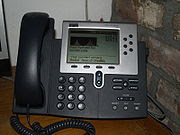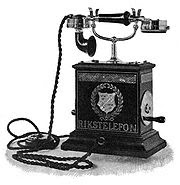Thursday, July 9, 2009
Telephone operating companies
IP telephony
IP telephony uses an Internet connection and hardware IP Phones or softphones installed on personal computers to transmit conversations encoded as data packets. In addition to replacing POTS (plain old telephone service), IP telephony services are also competing with mobile phone services by offering free or lower cost connections via WiFi hotspots. VoIP is also used on private networks which may or may not have a connection to the global telephone network.
IP telephones have two notable disadvantages compared to traditional telephones. Unless the IP telephone's components are backed up with an uninterruptible power supply or other emergency power source, the phone will cease to function during a power outage as can occur during an emergency or disaster, exactly when the phone is most needed. Traditional phones connected to the older PSTN network do not experience that problem since they are powered by the telephone company's battery supply, which will continue to function even if there's a prolonged power black-out. A second distinct problem for an IP phone is the lack of a 'fixed address' which can impact the provision of emergency services such as police, fire or ambulance, should someone call for them. Unless the registered user updates the IP phone's physical address location after moving to a new residence, emergency services can be, and have been, dispatched to the wrong location
Wednesday, July 1, 2009
Telephone
Digital telephony
IP telephony
Hardware-based IP phone
Internet Protocol (IP) telephony (also known as Voice over Internet Protocol, VoIP), is a disruptive technology that is rapidly gaining ground against traditional telephone network technologies. As of January 2005, up to 10% of telephone subscribers in Japan and South Korea have switched to this digital telephone service. A January 2005 Newsweek article suggested that Internet telephony may be "the next big thing."[1] As of 2006 many VoIP companies offer service to consumers and businesses.
IP telephony uses an Internet connection and hardware IP Phones or softphones installed on personal computers to transmit conversations encoded as data packets. In addition to replacing POTS (plain old telephone service), IP telephony services are also competing with mobile phone services by offering free or lower cost connections via WiFi hotspots. VoIP is also used on private networks which may or may not have a connection to the global telephone network.

